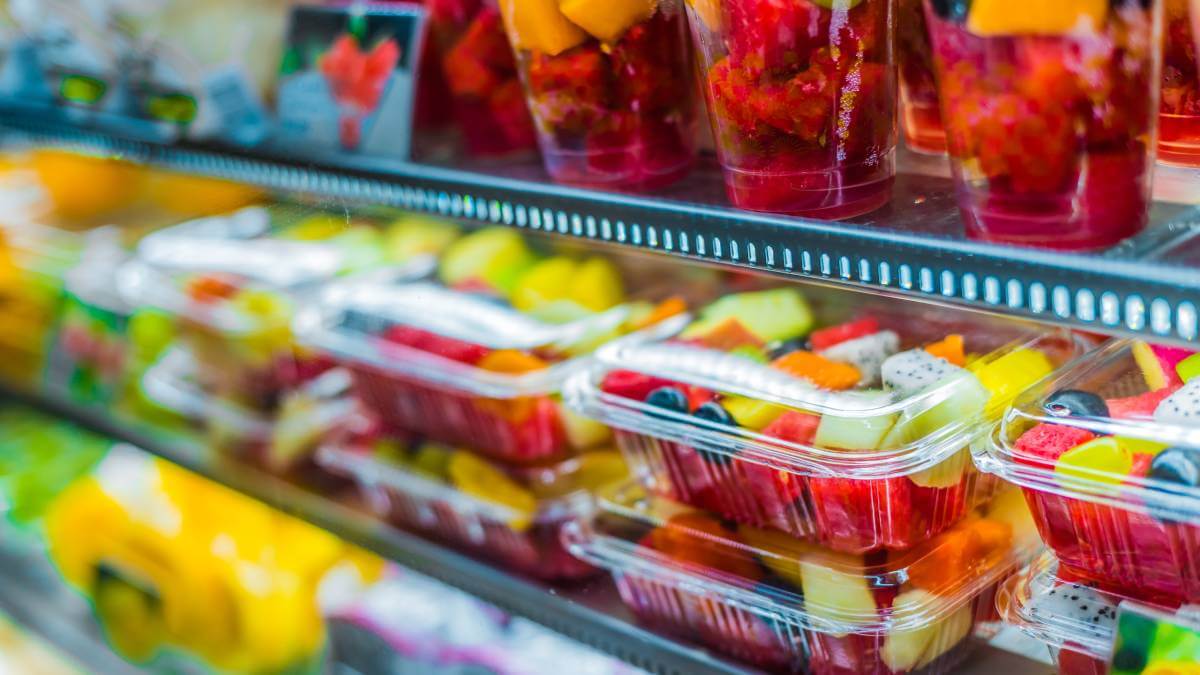The sight of extensive packaging in the fruit and veg section in supermarkets is a lesson in exasperation, but is enough being done to cut out all that unnecessary wrapping?
We’ve all seen those individually wrapped cucumbers and trays of two zucchinis and wondered ‘why?’
Well, despite everyone knowing it has to stop, a new report claims supermarkets are falling way behind in their promises to cut down on plastic packaging.
And when they do, quite often instead of reducing packaging, they are merely making the plastic more lightweight instead of using viable alternatives.
Cheaper than loose
It doesn’t help that produce wrapped in plastic is often cheaper than the loose offering.
The Australian Marine Conservation Society (AMCS) partnered with the Boomerang Alliance to deliver its first independent audit of plastic use across Australian supermarkets, and the results are not good.
Aldi is leading the race to cut plastic packaging, but despite its No. 1 spot it only achieved a score of 20 per cent less plastic packaging.
Second was Coles on 15 per cent, Woolworths at 10 per cent and running an embarrassing last by a long shot was Metcash – representing independent groups such as IGA and Foodworks – with a lowly 3 per cent.
Frustrated
The report, titled Unwrapped, was based on data provided by supermarkets, public reports and volunteer shopper surveys.
However, the authors were frustrated to uncover a “serious lack of transparency”, with most supermarkets reluctant to release data on their packaging reduction measures.
“We’re pleased to see Aldi leading the way with specific targets for cutting plastic packaging, including a target to reduce plastic in the fresh produce section,” AMCS plastics campaign manager Shane Cucow said about the report.
“It was also the only supermarket found to be enforcing policies on supplier packaging.
“It’s extremely disappointing to see Woolworths trailing behind in third place, due to a lack of clear targets to cut plastic use and poor transparency over its plastic footprint. As the largest retailer by market share, Woolworths should be using its influence to get suppliers to reduce unnecessary plastic packaging.”
Aldi’s submitted evidence of progress included replacing plastic with cadrboard, using recycled cardboard and decreasing the amount of plastic in the fresh produce section.
Hard to prove
However, the report stated that Aldi did not supply data on the weight and units of plastic packaging it used, making it difficult to verify the data provided.
In 2018, the federal government established the 2025 National Packaging Target to substantially reduce plastic packaging.
According to the Australian Packaging Covenant Organisation (APCO), which is charged with facilitating the delivery of the targets, Australia will not meet even one of the targets by 2025.
The 2025 targets are:
- 100 per cent reusable, recyclable or compostable packaging
- 70 per cent of plastic packaging being recycled or composted
- 50 per cent of average recycled content included in packaging (revised from 30 per cent in 2020)
- phase out of problematic and unnecessary single-use plastic packaging.
Boomerang Alliance director Jeff Angel said supermarkets had a huge influence on our daily lives but were not doing enough to reduce plastics.
“We continue to see wasteful plastics, such as unnecessary packaging of produce, plastic multipacks with several layers of packaging, and tiny plastic toy promotions that inevitably end up polluting the environment,” he said.
“Concerningly, our instore surveys showed that plastic-wrapped produce is frequently being sold cheaper than loose produce, providing a perverse encouragement for shoppers to use even more plastic. It’s madness.”
According to AMCS, soft plastics represent more than 40 per cent of plastic packaging found in litter clean-ups. Only about 13 per cent of plastics are recycled in Australia.
Are you concerned about the amount of packaging at the supermarket? Why not share your opinion in the comments section below?
Also read: Food fraud costs Australia billions and can cost lives


There’s way too much unnecessary packaging but will things change anytime soon? I doubt it. Too many people wth don’t care attitudes out there.